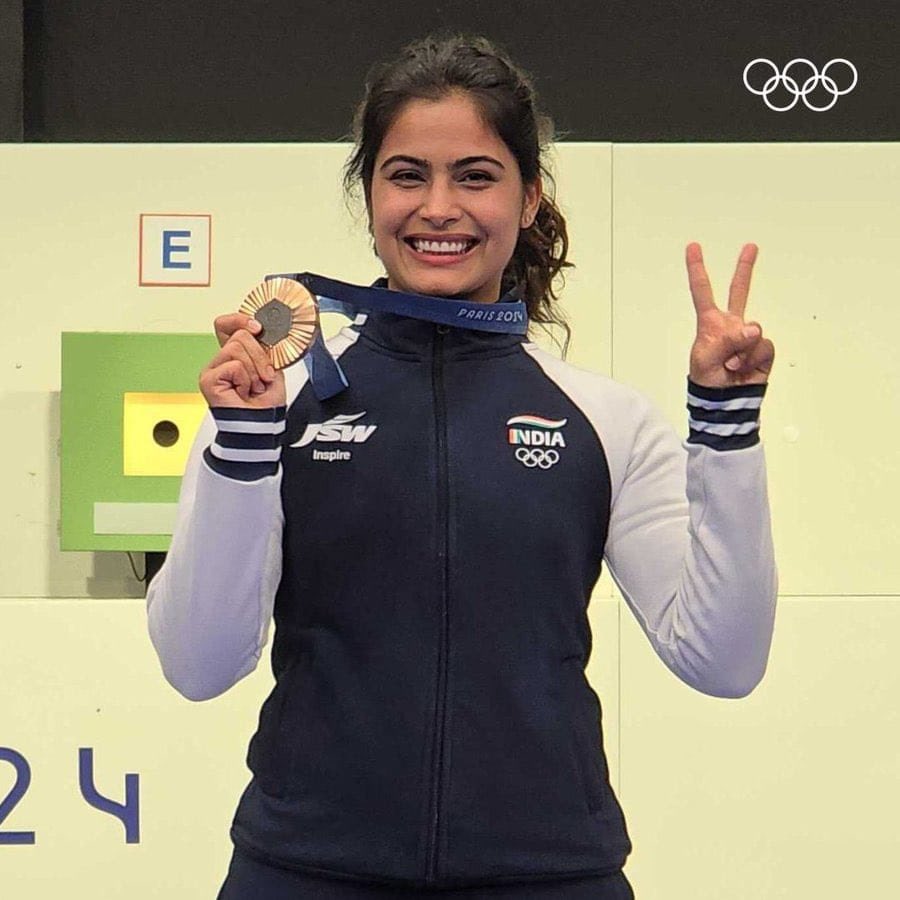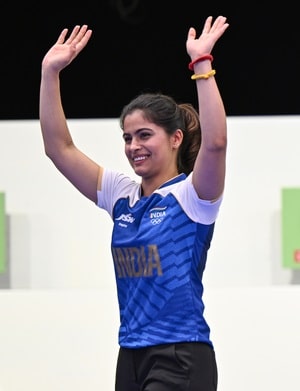(August 3, 2024) The girl from Jhajjar district in Haryana was always bent towards sports – martial arts, boxing, or skating – but it was her tryst with shooting that changed her life. Two months into exploring the sport at her school, she requested her father for a pistol. A chief engineer in the Merchant Navy, he wondered if spending ₹1.5 lakh investment would be worthwhile. On Sunday, she proved that choosing shooting was indeed the right decision as Manu Bhaker became the first Indian to win multiple shooting medals at the Paris Olympics 2024. She got India off the mark at the Paris Olympics by securing a historic bronze medal in the women’s 10m air pistol event, followed by another historic win in the 10m pistol mixed event with Sarabjot Singh.
After years of hard work, blood, and sweat, the 22-year-old got to bite an Olympic medal, becoming the first Indian woman to earn a shooting medal at the Summer Games. Expressing her elation, the Global Indian wrote on X, “Extremely humbled by the support and wishes that have been pouring in. This is something that I’ve always dreamt of. Proud to perform at the biggest stage for my country.”
Extremely humbled by the support and wishes that have been pouring in. This is something that I’ve always dreamt of. Proud to perform at the biggest stage for my country 🇮🇳 ❤️ pic.twitter.com/8U6sHOLulR
— Manu Bhaker🇮🇳 (@realmanubhaker) July 30, 2024
Ever since she burst on the scene with the gold in the 10m air pistol at the 2018 Youth Olympics, all eyes have been on the young athlete. But despite the countless medals, the ultimate prize remained out of reach, especially after the heartbreaking defeat in her first Olympics in Tokyo. But she returned to the Paris Olympics with a will to fight and win, and she did.
Love for sports
A native of Goriya village in Jhajjar district, Manu always excelled in sports like Huyen langlon, a Manipuri martial art, as well as boxing, tennis, and skating and won many medals. It was in 2016 that she was introduced to shooting at Universal Senior Secondary School – the only place to have a shooting range in her district. 25 km from her home, she would practice for five hours every day. Within a few months, she asked her dad to buy her a pistol as wanted to take up competitive shooting. A year later, she achieved her first international success by winning the silver medal at the 2017 Asian Junior Championships. The same year, she won nine gold medals at the National Games.

Manu Bhaker
Going global
2018 brought with it more opportunities and more medals on the international stage. She won two gold medals at the International Shooting Sports Federation World Cup held in Mexico, followed by a gold medal at the Commonwealth Games 2018. Talking about her success, she said, “It just happens. I don’t think about them. At times I don’t even know what the records are,” adding, “I am grateful to all my coaches or their advice and the hours they have put in to hone my technique.”
The wins and great performances earned her a spot at the Tokyo Olympics. Still, she returned home empty-handed and teary-eyed from her maiden Olympics, falling short of expectations. The Tokyo heartbreak led to a public fallout with her coach Jaspal Rana. She soon retrieved her shell and lost the spark that she had for shooting. Instead, she started finding the sport boring which for her had become more “like a 9 to 5 job.” “That was the time I felt ‘okay, I am still in the team, I am doing okay, but it’s not giving me any kind of joy and any kind of happiness’. I felt like that was the time I should give it a break and probably focus on my studies, go to a college, and study abroad for a while. I was really thinking about it,” she said in an interview.
Reuniting with coach Jaspal Rana
However, Manu did not give up. She picked up the phone and called her former coach Jaspal Rana to bury the hatchet. Keeping their egos aside, the two reunited and Manu started practising under her coach once again. Whether she was training in Luxembourg or Dehradun, Rana set specific targets for Manu even during routine sessions. If Manu failed to achieve the score set by Rana, she would incur fines, which were then donated to help those in need around the world. “His working method is very different from the rest of the people. Usually, he sets a goal and if you score that much, then it’s okay,” she said, adding, “And if you don’t score that much, then the points that were less in that score, let us say we decided to score 582 and I scored 578. So those four points will amount to 40 Euros and sometimes 400 Euros depending on the situation and country. You have to donate that much.”


Manu Bhaker
Along with intense training methods, she began reading the Bhagavad Gita for mental fortitude. “I have become religious after Tokyo but not in an extreme way (laughs). I believe that there is an energy that guides us and protects us. And there is an aura around us that feeds on that energy. I think there should be some faith in God who has created us,” she said.
In 2024, she returned to the international stage with vigour and determination, and it paid off as she clinched two the bronze medals and become an unmissable part of India’s Olympic history.
- Follow Manu Bhaker on X




